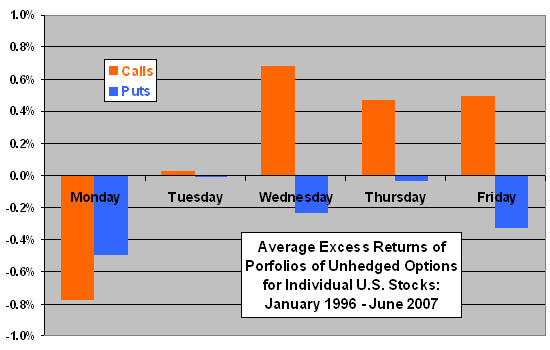Does reluctance of traders to hold naked short positions in individual stock options over weekends induce a weekend effect for option prices? In the February 2010 revision of their paper entitled “The Weekend Effect in Equity Option Returns”, Christopher Jones and Joshua Shemesh employ a portfolio approach to investigate a weekend effect for put and call options on U.S. stocks. They compute portfolio excess returns as the equally weighted average of individual option contract returns based on bid-ask midpoints, in excess of a short-term yield. Using price data for a filtered set of U.S. equity options and for the underlying stocks over the period January 1996 to June 2007, they conclude that:
- Individual stock options have markedly lower returns over weekends (Friday close to Monday close) than any other day of the week. Over the entire sample period, the average Friday-Monday return across all option portfolios is -0.62%, while average returns for all other days of the week are positive. (See the chart below for put and call portfolios separately.)
- Results hold for puts and calls over a wide range of maturities and moneyness, for portfolios weighted equally and by open interest, and for subsamples restricted to the most liquid options. However, there is little evidence of a weekend effect in S&P 500 Index options.
- Findings are generally consistent by year over the sample period, with put option behavior decisive in many years.
- There is no evidence of a weekend effect in underlying stock price, option bid-ask spread, option trading volume or option open interest that could drive the results.
- The weekend effect is stronger for non-expiring options over option expiration weekends and for periods of high stock market volatility. It is present to a lesser degree over mid-week holidays.
The following chart, constructed from data in the paper, reports average excess returns based on closing bid-ask midpoint by day of the week for all portfolios of unhedged put options and all portfolios of unhedged call options (equally weighted across contracts) over the entire sample period. Monday returns are significantly negative for both puts and calls.

Note that:
- All returns calculations ignore trading frictions, which are proportionally large for options due to the bid-ask spread.
- Determinations of statistical significance assume normality of the option return distribution. If the distribution is not normal, the average past return may not be a good indicator of expected future return.
In summary, evidence indicates a potentially exploitable tendency for prices of individual U.S. stock options to drop over weekends.